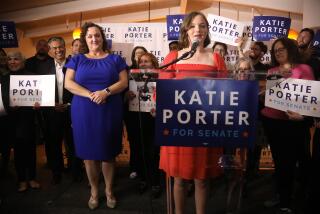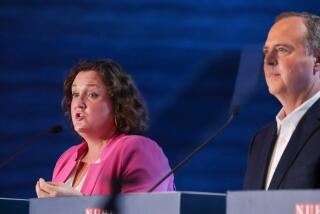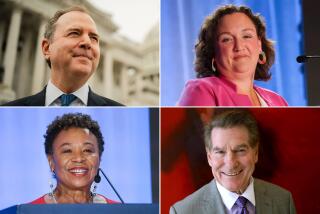Democratic senators who won with Obama’s help may not want it now
NASHUA, N.H. — For better or worse, they are the class of Obama.
Eight Democratic senators swept into office partly on Barack Obama’s 2008 coattails are facing their first reelection bid without the benefit of having the president on the ballot and at a time when his approval rating is near an all-time low.
The future of the Senate, and President Obama’s ability to push through an agenda during his final two years in office, rests largely on their fate.
Democrats hold a five-seat Senate majority, when two independents aligned with the party are included. That means Republicans hoping to retake control of the upper chamber for the first time since 2007 need to pick up six seats this fall.
And the party is targeting this first-term Democratic group to help them get there.
On the front lines are North Carolina’s Kay Hagan and Alaska’s Mark Begich, running in traditionally conservative states that Mitt Romney carried in the last presidential election. Mark Udall in Colorado and Jeff Merkley in Oregon watched their already tough races tighten after the rocky rollout of Obama’s healthcare overhaul.
Two former governors, Mark R. Warner of Virginia and Jeanne Shaheen of New Hampshire, are now seen as potentially vulnerable, and their races have drawn interest from high-profile Republicans. Former Republican National Committee Chairman Ed Gillespie is taking on Warner, while former Massachusetts Sen. Scott Brown, a rising star in the party before his 2012 defeat, is flirting with a run in New Hampshire.
Only Tom Udall of New Mexico and Al Franken of Minnesota, from two of the bluest states in the group, appear safe at this early stage.
“All of these senators are dealing with a fundamentally different environment than the one in which they were first elected,” said Nathan Gonzalez, an analyst for the nonpartisan Rothenberg Political Report. “The question is how much worse than 2008 is it going to be?”
Sen. Charles E. Schumer of New York, who helped guide the eight to victory in 2008 as chairman of the Democratic Senatorial Campaign Committee, says they are not as vulnerable as some people think.
“Despite the onslaught against them, their numbers are pretty good,” he said. “Obviously an off-year election is more difficult. But each of them has a good record of accomplishment and each of them is a more savvy politician today than they were then.”
Of five races where recent polling is available, Hagan trails her potential Republican opponents and Mark Udall and Begich have slight leads in their races. Shaheen leads Brown in a hypothetical matchup. Only Warner polled above the 50% threshold that analysts say is a key indication of an incumbent’s strength.
All eight are focusing their campaigns on local issues and accomplishments, something that’s right out of the standard campaign playbook for first-term senators.
But Obama — whose historic 2008 candidacy helped them snatch seats that had been in Republican hands — keeps emerging as a major factor in the races as Republicans seek to exploit the president’s growing unpopularity with conservatives and independent voters.
At the same time, since Obama isn’t on the ballot, the candidates won’t benefit from his ability to draw Democrats to the polls, particularly minority voters who could play a key role in several races.
Nowhere is this challenge clearer than in New Hampshire. In 2008, Obama led a clean sweep for Democrats, electing Shaheen in a tight battle against a Republican incumbent, and reelecting Democrats to Congress and governor.
Without Obama on the ticket in 2010, the Granite State turned decidedly conservative, electing a full Republican slate to Congress and historically large majorities in the statehouse. In 2012, with Obama again leading the ticket, the pendulum swung back toward Democrats, who retook both of the state’s congressional seats, the governorship and half of the Legislature.
So like other Democrats seeking reelection, Shaheen faces a tough decision on whether to embrace the president or keep him at arm’s length. There are signs that many senators are opting for the latter.
During a presidential visit to North Carolina last month, Hagan did not join Obama for a photo opportunity, blaming a vote in Washington. Mark Udall, who campaigned with Obama in Boulder, Colo., in the final weeks of the president’s 2012 reelection campaign, said last month he was unsure whether he would do the same now. “We’ll see what my schedule is,” he said.
Begich, who frequently notes that he won his 2008 race even though Obama lost Alaska, distanced himself further from the president after last month’s State of the Union address, expressing “disappointment” and warning Obama against going “too far” in issuing executive orders.
Shaheen’s statement after the address was noticeable for what it lacked: any mention of the president at all.
In an interview, Shaheen insisted that the president’s policies and popularity weren’t guiding her work or her campaign. “There are always things that are outside of your control,” she said. “My focus is on what I can — I don’t know if ‘control’ is the right word — but what I can work on. Where can I work to make a difference.”
For her, that includes helping small businesses in New Hampshire and securing funding for the Portsmouth Naval Shipyard, two issues she highlighted on a trip to a veteran-owned business on a frigid day during the last congressional recess.
But in fundraising emails, her campaign doesn’t shy from acknowledging the target on her back.
“I’m under no false illusions,” Shaheen wrote in a recent letter seeking money to combat “the Kochs, the RNC and their right-wing allies.” She added: “I know what the GOP sees: They think I’m vulnerable because I’m the only Democrat elected to the Senate from New Hampshire in 30 years.”
Shaheen won’t say whether the president will come to New Hampshire, as he did often in 2012 and 2008. But she’s working to inoculate herself from his political baggage, especially Obamacare.
As the struggles of the healthcare law dominated the headlines in October, Shaheen broke with the White House and penned a letter to Health and Human Services Secretary Kathleen Sebelius seeking to extend the enrollment period beyond the end of March. Nine other Democrats signed the letter, including four other members of the 2008 Obama class.
Nevertheless, Republicans are pounding the senators over Obamacare. The political attacks are particularly challenging because, as newcomers, their support for the Affordable Care Act in 2010 stands as their most significant vote to date, along with their support for the more than $800-billion economic stimulus bill of 2009.
Though more experienced senators might be able to fall back on broader records or have other accomplishments under their belts, these senators are — or appear — deeply vested in two of Obama’s signature programs.
“Democrats are heavily wedded to his agenda,” said Rob Collins, executive director of the National Republican Senatorial Committee. “Candidates like Jeanne Shaheen, who Democrats claim has her own brand, are seeing that brand being overwhelmed in a negative way by Obama.”
Americans for Prosperity, a conservative political action committee with ties to the Koch brothers, recently launched ads against Shaheen and Hagan, as well as veteran Sen. Mary L. Landrieu of Louisiana, over their healthcare votes.
The ad against Hagan taunts her as Obama’s “best friend,” saying she votes with him 96% of the time. The ads show video of the women assuring constituents — as the president did — that if they liked their current health plans they could keep them. That promise was later dubbed the “lie of the year” by independent fact-checker Politifact.
Jim Rubens, a former New Hampshire state senator and one of two Republicans running to replace Shaheen, called her a rubber stamp for Obama, a deep insult in a state that prides itself on its independence.
Last week, as Obama huddled with Senate Democrats at Washington’s baseball stadium to plot election-year strategy, the president acknowledged that his woes were complicating the fate of his congressional allies and signaled he might keep his distance if that would improve a candidate’s chances, according to lawmakers at the meeting.
“He wants us all to win,” said Richard J. Durbin of Illinois, the No. 2 Senate Democrat. “But he may be of more benefit to me in Illinois than he might be in some other states.”
Senate Majority Leader Harry Reid (D-Nev.) recently defended Obama’s popularity, insisting that all Democratic candidates would welcome a presidential visit. A day later, after hearing from some of those Democrats, Reid changed his tone.
“It’s up to the individual senators,” Reid said. “I can’t tell them who to ask to campaign for them. That’s up to them.”
More to Read
Start your day right
Sign up for Essential California for news, features and recommendations from the L.A. Times and beyond in your inbox six days a week.
You may occasionally receive promotional content from the Los Angeles Times.







